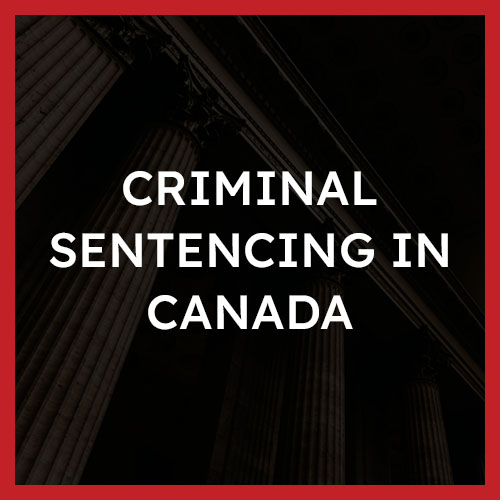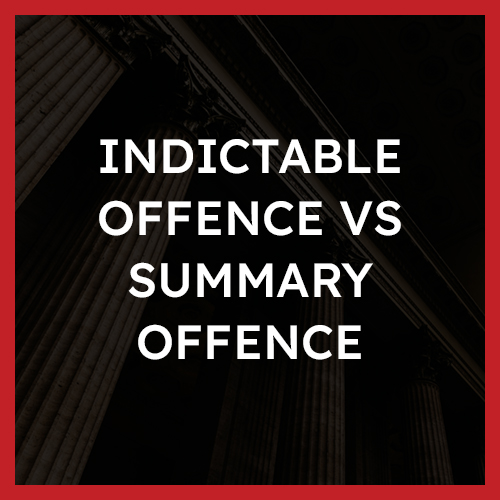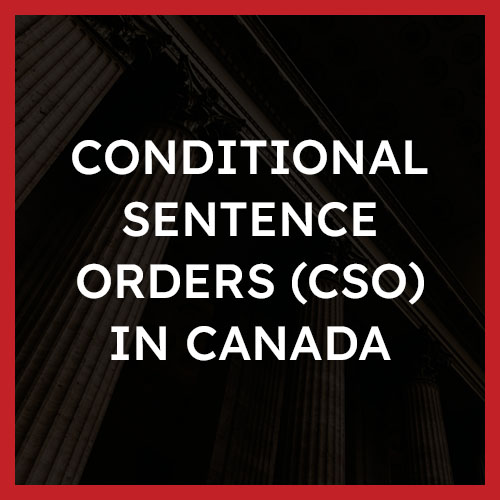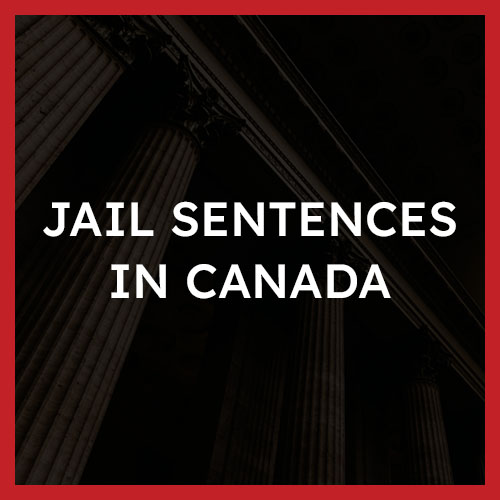Criminal Sentencing in Canada
What is Criminal Sentencing?
 Criminal sentencing occurs after you enter a guilty plea or after the judge or jury has found you guilty of a criminal offence.
Criminal sentencing occurs after you enter a guilty plea or after the judge or jury has found you guilty of a criminal offence.
During the sentencing process, the judge hears from the Crown Prosecutor and the defence as to what the appropriate sentence should be, and why.
In assessing the positions put forward by the Crown and defence, the judge must keep in mind all the sentencing principles set out in section 718 of the Criminal Code of Canada (the “Code”), as well as any minimum or maximum sentence set out in the Code for the particular offence.
The principles in section 718 are as follows:
In determining the appropriate sentence, a judge must carefully consider each of the above principles. Even if the defence or Crown put forward a sentence that is deemed appropriate to both parties, if the sentence does not align with the principles in section 718, or a particular sentence mandated by the Code, a judge cannot accept it.
Aggravating and Mitigating Factors
In addition to the sentencing principles set out in section 718 of the Code, section 718.2 provides that a sentence should be increased or reduced relative to the aggravating or mitigating circumstances of the offence and/or the offender.
Examples of aggravating circumstances, which call for an increase in sentence include evidence that:
- The offence was motivated by bias, prejudice, or hate based on race, age, disability, sexual orientation, etc;
- The offender abused a position of trust or authority;
- The offence had a significant impact on the victim;
- The offence was committed at the instruction of, or in association with, a criminal organization; and/or
- The offence was committed while the offender was released on parole or subject to a conditional sentence order.
Conversely, mitigating factors will help show the judge why your sentence should be reduced.
While there is no exhaustive list, mitigating factors including personal circumstances such as:
- Being a young offender;
- A lack of, or minimal, criminal history;
- The degree of remorse you have for your actions;
- Substance abuse and mental health disorders; and/or
- Physical or emotional abuse you’ve experienced.
Sentencing Range
The sentence you can expect to receive varies greatly depending on the type of offence, as well as the specific circumstances of your case.
Generally speaking, the range of sentences from most lenient to most onerous is as follows:
- Absolute Discharge
- Conditional Discharge
- Fine Order
- Suspended Sentence and Probation
- Conditional Sentence Order (a.k.a. house arrest)
- Intermittent Jail Sentence (a.k.a. weekend jail)
- Straight Jail Time
Planning For Your Criminal Sentencing
Whether you plead guilty or were found guilty at trial, there is no reason to proceed to sentencing on the same day.
Unless the offence is relatively simple and the sentence you want is agreed to by the Crown, it is quite common to adjourn the sentencing for two to three months to gather relevant information.
While there is no set list of information you should prepare, you should provide your lawyer with anything you believe is relevant.
If you are unsure, please contact one of our lawyers immediately and we will assist you in understanding what may be necessary to provide.
Some of the information you should consider gathering includes:
- Your employment record;
- Any volunteer and/or community involvement record;
- Records of grades (if you are in school);
- Reference letters from your employer, family, friends, etc;
- Apology letter, if applicable;
- Record of counseling or treatment, if applicable;
- Record of repayment of damages, if applicable;
- Driving abstract, if applicable; and/or
- Medical/mental health records.
When a jail sentence is a realistic possibility, it is common to order a “pre-sentence report” or a “forensic report.”
Pre-sentence report
A pre-sentence report is a report about you, prepared by a probation officer. The main purpose of the report is to advise the court if you are a suitable candidate for community supervision.
Typical procedure is to order the report, then set up an appointment with probation to interview you.
Among other things, you will be expected to describe your childhood, upbringing, education, financial history, and your emotional and social adjustment.
The probation officer will ask you for your friends’ and family’s contact information, as well as other supporting documents to corroborate the information you provide.
Forensic report
A forensic report is also a report about you but is prepared at the hospital by a psychologist or psychiatrist.
The report is typically ordered when an underlying psychological or psychiatric condition is believed to affect you and may have contributed to the offending behaviour.
After the report is ordered, you will be contacted to set up an appointment for preparation of the report.
The doctors completing the report will likely ask you much of the same information that forms part of the pre-sentence report, but you may further be expected to discuss the offence itself, as well as complete certain psychological tests.
Both pre-sentence and forensic reports typically take 2 to 3 months to prepare, hence why sentencing is usually adjourned for that length of time.
It is always important to review the report in detail to make sure it is accurate, and to be able to address any concerns raised in the report.
What’s Next?
There is significant skill involved in presenting sentencing submissions, including paying close attention to both the structure and substance of the submissions.
Sentencing is your opportunity to ensure that the judge sees who you are as a person, beyond the offence you committed.
For these reasons, it is important to present all the relevant information the judge may require to arrive at the most appropriate sentence.
At Strategic Criminal Defence, our lawyers are highly dedicated and skilled at securing the best possible outcome for our clients at all stages, from pre-charge legal advice to sentencing.
Contact us today with any questions you may have regarding the criminal sentencing process.
About The Author








